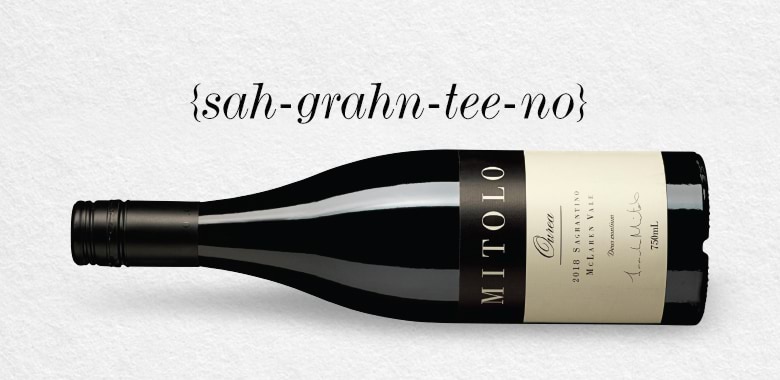
Wine
What is Sagrantino?
If you love big, bold varieties like shiraz and cabernet, expand your palate with this Italian beauty.
Australia has a reputation for being the land of the big, brooding red wine. We cut our teeth on Shiraz and Cabernet Sauvignon. Sure, Pinot Noir and more elegant styles are enjoying the limelight currently, but for many of us – big means best.
So, for those of us who like our red wines big and bold, then Sagrantino should be on your hit list.
Shop Sagrantino
AN INFOGRAPHIC GUIDE OF SAGRANTINO
Originally from Italy, Sagrantino wine has been grown in Australia since 2000.
Sagrantino thrives in hot climates and is similar in weight to Shriaz, Cabernet and Durif.
Sagrantino pairs well with high fat foods, braised meat and Italian.
Sagrantino is perfect for cellaring for over 10 years.
Sangrantino wine is full bodied with strong tannins.
Sagrantino is one of the most tannic red varieties in the world which makes it great for ageing.
Sagrantino In Italy
Sagrantino’s spiritual home is the central Italian region of Umbria. It is here that around 90 per cent of Italy’s plantings can be found.
The most noted renditions of Sagrantino are the wines of Montefalco Sagrantino DOCG – grown around the hilltop town of Montefalco.
The wines are dark and brooding in style with robust tannins. Many describe Sagrantino as Italy’s most tannic variety, exceeding even Nebbiolo in this respect.
Sagrantino doesn’t have the same fanfare as Sangiovese, but it is leading the charge in changing the common perception that southern Italian red varieties lack the class of the more celebrated red wines of the north.
Sagrantino In Australia
Much like in Italy, in Australia, Sagrantino is not as widely grown or as well-known as Sangiovese.
However, with the explosion of interest in new wave varieties that we have seen over the last decade, we are now seeing more examples of Sagrantino being produced here.
McLaren Vale is a hotbed for the variety and there are superb examples produced in both the Barossa Valley and in Victoria’s King Valley.
The majority of examples made in Australia are not as tannic as the Italian examples, but they will still satisfy the most religious of Cabernet Sauvignon or even Shiraz drinker.
What does Sagrantino taste like?
Sagrantino produces wines that are full of colour, aromatic presence and flavour generosity. Its fruit profile spans the breadth of black, blue and purple fruits.
A number of savoury characters such as tobacco, smoked meats and rosemary are also common. Sagrantino is a unique wine in that it can seem sweet and savoury all at once.
Tannin plays a pivotal role and this means the wines have the ability to age. In fact, in Italy, the local law stipulates that the wine must not be released until it has aged for at least 37 months.
However, although tannic, with the use of oak aging and gentle winemaking, Sagrantino can also be approached in
its youth.
What Food to Pair with Sagrantino?
Given its power and richness, Sagrantino is best paired with dishes of equal power and substance. It works well with game meat and dry aged beef.
Mushrooms, beetroot and lentils are your best go-to vegetable options or do as they do in Umbria and serve with cured meat and sausage made from pork and wild boar.